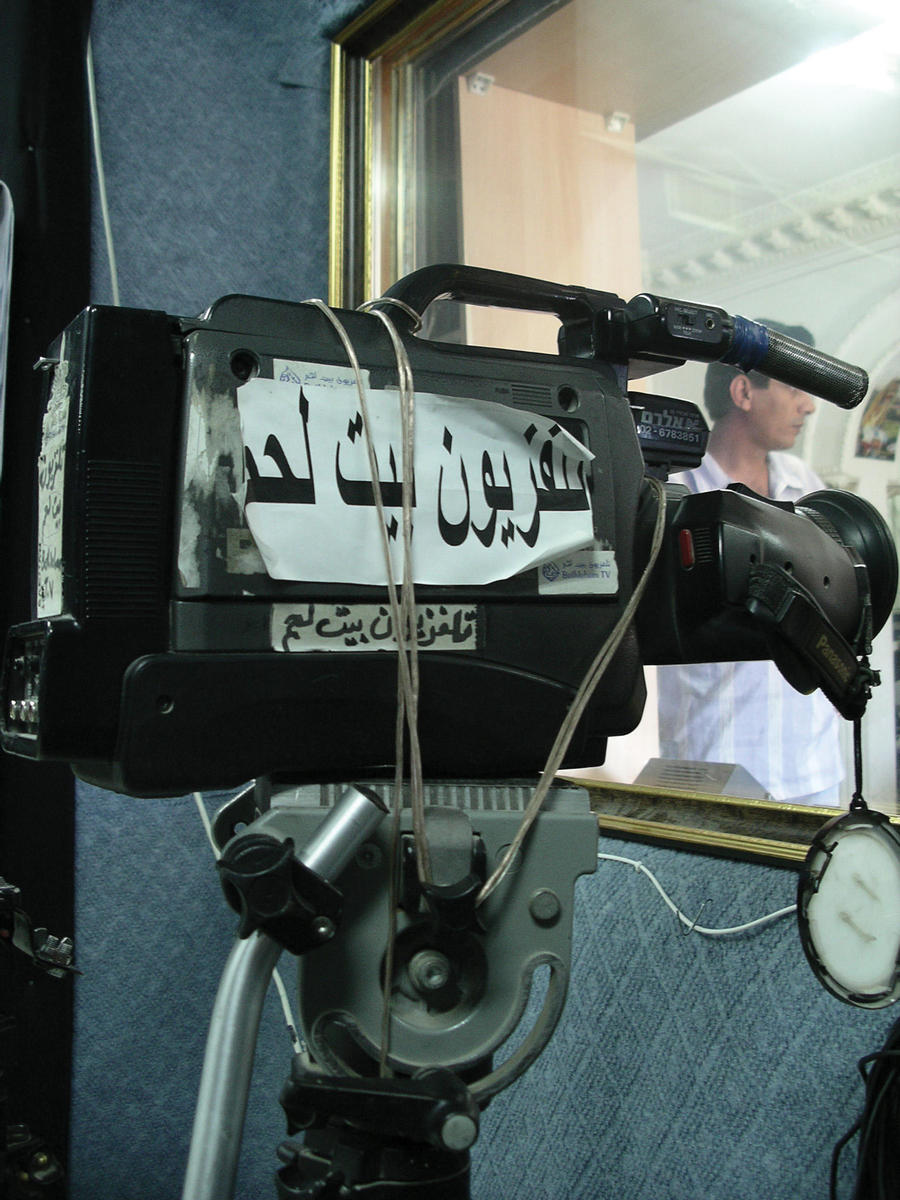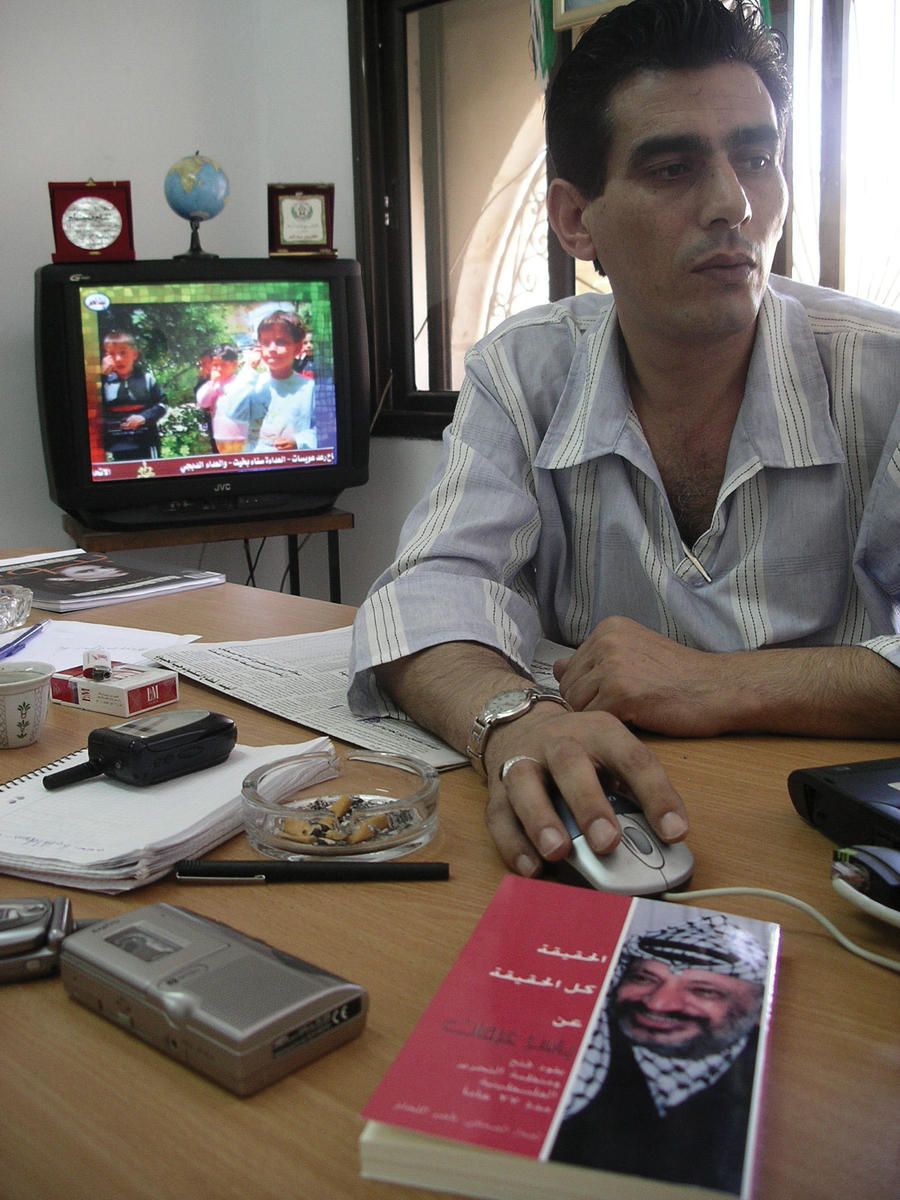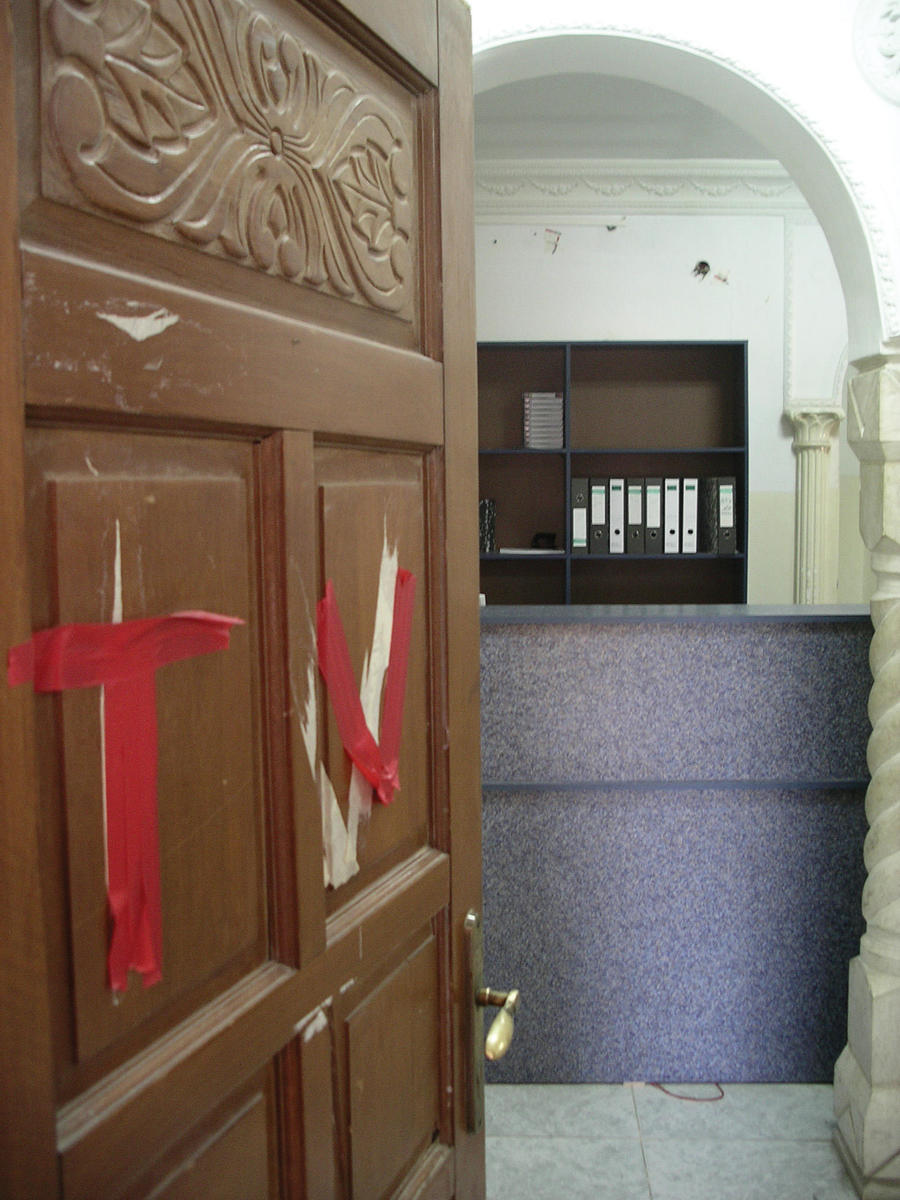
Bethlehem TV, third floor. A destination only reached after crossing checkpoints and changing means of transport several times — the everyday reality of getting around in Palestine. There are no direct routes from A to B. Bethlehem: headquarters of a local TV station that has already made a name for itself. Bethlehem TV is the only private Palestinian TV channel (out of twenty-nine) broadcasting a translated version of the Israeli eight o’clock news, daily. The producer and driving force behind the program is forty-year-old Nasser Laham. When I arrive, he is on the phone, though he beckons me in. I catch bits of the conversation. Laham is involved in a lengthy discussion on the recent European Court of Justice decision, how psychologically crucial the ruling is for the Palestinians, what impact a judgment in their favor will have, and how the psychological effect is comparable to the Israeli withdrawal from southern Lebanon.
Laham laughs as he puts down the handset. An Israeli officer had been on the other end of the line. His chief editor glances into the room, looking worried. Laham appears to be playing with fire. Shortly afterwards, he receives an official request to appear in the main army headquarters to discuss the issue in more detail. But he won’t be going — the limits are clearly fixed. The provocation has had its effect.
Nasser Laham can allow himself such bold actions — there are few who can claim to have gained the respect of so many different sides. During our interview he shows me awards he’s received in recognition of his work from across the political spectrum, from the Journalist Association, from a kindergarten, from the Christian community in Bethlehem. Nasser Laham is a Muslim, lives in a refugee camp, was a former communist and activist during the first Intifada, and spent six years in an Israeli jail: perhaps a classic Palestinian biography.
Before his arrest, Laham studied psychology and philosophy; since his release, he has been working as a journalist and translator. “It happened by chance. They needed a translator in the office. People got to know that I could translate from Hebrew into Arabic and came with the Hebrew newspaper to get to know what the Israelis were up to. More and more people came and asked me to continue. I saw that there was a need — and I stayed.”
Laham’s program is watched by thousands of people every day, and his name is known far beyond Bethlehem itself. As Hani, a taxi driver in Jerusalem says: “It’s very important to know what the Israelis think about us. There is much too little exchanged. We don’t know them, they don’t know us.” Nasser Laham belongs to that group of people who do not allow themselves to serve an ideology; they have learnt the dangers ideologies harbor. Instead, he works tirelessly to enable his fellow humans to gain access to information, letting them exercise their rights as responsible adult citizens. A democratization machine? Far from it. He always acts independently and is miles away from making the running for one particular cause. “As soon as someone tries to interfere, sponsor, or influence my work — I’m off!” Laham believes in information and the freedom to shape one’s own opinions — a belief he applies to journalists too. Laham has been translating the news programs since the beginning of the second Intifada: “Translation is a kind of civilized way to think about the future. If you want to accept the other, if you can translate their culture, their art, their social life, maybe you no longer have any reason to occupy them. I’m giving my people this, just by giving them access to the data, the information.”
Laham’s translations, however, are not universally applauded. In certain Arab circles the use of Hebrew is still seen as a problem. Across large parts of the neighboring Arab states Hebrew is taboo, since the language itself is considered synonymous with war and misery — a language where the sound of occupation still resonates in the melodies of the sentences. But as a Palestinian, one has a more direct confrontation with Hebrew, and one that is far more necessary — a view not always shared by others. “I know about the accusation. But people should not forget that I learned Hebrew in prison. They have no right to criticize us like that. And honestly I do not have any problem with the Hebrew language — because I do not judge a language by politics. Honestly, I like the Hebrew language, its poems, its rhythm. I believe in equality and difference, and I don’t feel any conflict. It’s easy.”
Laham sees his work as serving enlightenment — a loaded word, though one that nonetheless in this political instance seems to have retained its original meaning, being located at a crisis point of ignorance and blindness when concerned with “other people.” “The Israeli–Palestinian struggle is simply based on a misunderstanding, the Israelis’ misconception that someone promised them they’d find the safest place on earth here. And suddenly they had to discover this isn’t true at all. Someone misled them, but they try very hard to prove the opposite. But the truth is something else. It is the same with the Palestinians. The Palestinians have been cheated by the Arabs. They told them okay…come on, we’ll fight, so keep the keys and we’ll give you the promised land. So, in the end, we’re talking about a big misunderstanding.”

After two years of broadcasting, news of the program’s success had spread, even reaching Israeli TV producers. Six months ago, Channel 10 started broadcasting a fifteen-minute news program translating the Arab news into Hebrew. Is this a first victory in the battle to overcome the presentation of stereotypes? “The Israeli people don’t know any details about the Palestinians, apart from the information coming from the Shin Bet and the army. This program is the first one of its kind since 1948. But in contrast to our program, they choose the news they translate. If you select your news, you miss the chance to break stereotypes.” A fact proving there is still a long way to travel down the road to objective reporting. The political situation continues to influence everyday work and it takes considerable effort to resist its undertow. “We journalists can just try to be the antibiotic for this situation — but if it’s cancer, I give up. An antibiotic is only good against flu or something like that.”
But Laham does not just see himself as a journalist providing a supply of antibiotics. He has also published his first book, the landmark work The Only Truth about Yassir Arafat. This book, decorated by a portrait of Arafat, can be read as a statement, a joke, or a really ingenious idea because when you open the book, there is no text at all, just a mass of empty pages. Not one single page has anything printed on it. Laham invites his readers to write down their own history of Arafat — an idea born from noticing that not a single book on Arafat was available throughout the territories. During a visit to Germany, Laham had come across a book consisting of nothing but empty pages. “They told me that the author had decided to produce an empty book to criticize the government or those who didn’t allow him to publish anything. I liked this idea very much and tried to find a way to do something like this here, but I couldn’t find any funds.” In the end, he paid for the first edition of 9000 copies himself and distributed them across the country.
“In the beginning everyone was shocked because they expect you to criticize, or at least to be against, the system. But let’s suppose we want to say something, but we can’t. So we keep silent. Silence is another way of showing your anger. Silence is art. Love is art. But hate is not art. I believe that silence is also another form of translation — a very powerful one. And it is an international language. There is no need to translate. Sometimes I get tired of translating and mediating — and I am suffering. The silence gives everyone a chance to understand what I have to say — without any need for translation.”
Laham seems to be swimming against the stream — at least, that’s what it looks like at first glance. But would that alone have made his program into such a success? Doesn’t his work show the need there is for more information? One should refrain from making the mistake of seeing his work as serving some kind of exchange between Israelis and Palestinians, something Europe likes to support and promote so much, yet so often remains merely on the surface. This is not mere photogenic hand-holding or forced “understanding of each other.” Rather, it is about using direct information as a chance to let people get their own idea of what is happening, and make their own decisions — like opening a window. A simple step, yet a very courageous one. “Sometimes it’s quite difficult for me. Let me give you an example,“ he says, laughing. “When you put one normal guy in a room with nine crazy people, who will be the crazy one in the end? The normal guy — so you know how I feel.”
www.bethlehem-tv.com
